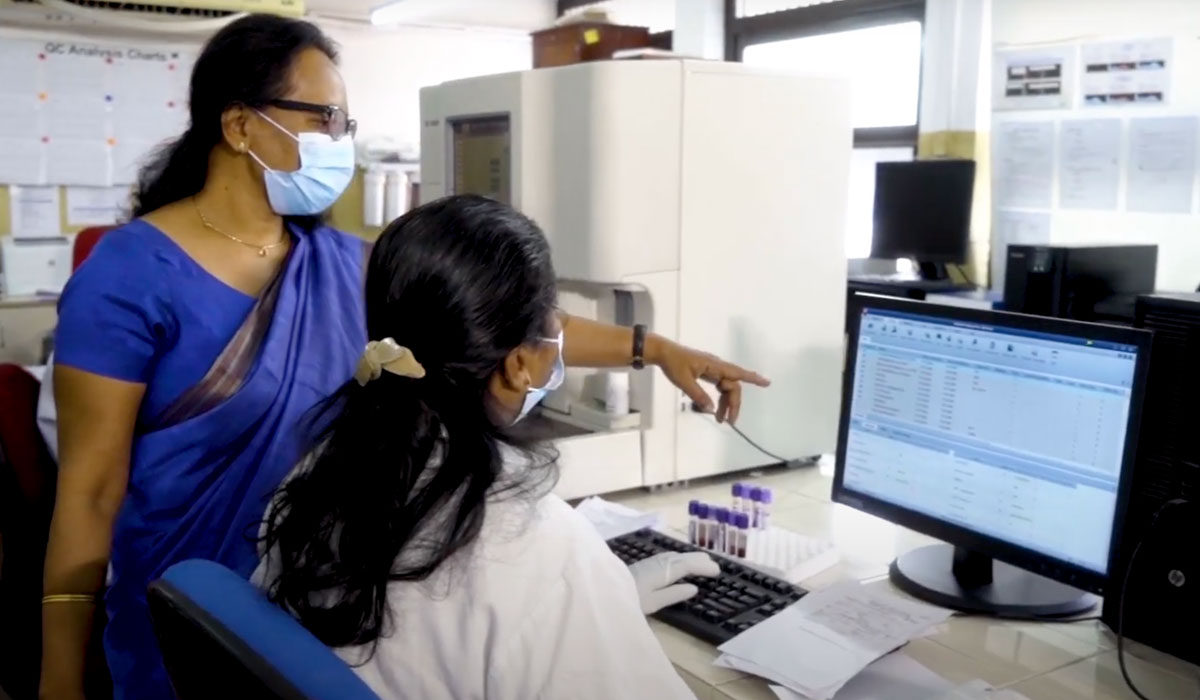In addition to providing people with bleeding disorders (PWBDs) non-factor replacement therapy for prophylaxis, the National Hospital also sends data back to the WFH. This data includes factor consumption, factor availability, inhibitor status, physiological activities, physical activities, physiotherapy improvements, etc. The data is inputted into the WFH databases and used to optimize care in Sri Lanka and gather learnings that can be leveraged for other countries. Ultimately, for HTCs like the one in the National Hospital in Colombo, the WFH Humanitarian Aid Program aims to provide sustainable care by helping them with the collection, interpretation, and dissemination of data. The goal is to increase impact by better leveraging humanitarian aid in all WFH country programs.
Rupa Amarawathi’s son’s hand started swelling when he was three months old. For a long time, the swelling would come and go despite the treatments he was receiving. Finally, he was diagnosed with hemophilia. Now, his hand rarely swells, he’s able to go back to school, and his hospital visits have drastically decreased. Access to information makes all the difference for people like Amarawathi’s son. While information helps with diagnosis, it also helps HTCs use resources more efficiently. For example, the Program helps specialists learn to use donations based on expiry date, flag upcoming needs, and determine if a PWBD can receive prophylaxis depending on stock levels.
Chandima Thevarapperuma, MD, at the Lady Ridgeway Hospital for Children, in Colombo says that before her hemophilia treatment centre (HTC) started working with WFH Humanitarian Aid Program, they couldn’t do prophylaxis with bypassing agents because of very limited resources. Now, all that has changed. Resources have increased, but data—available through the WFH Humanitarian Aid online database—has also increased, allowing HCPs to care for PWBDs more effectively. These two developments, have, in tandem, allowed overall care to increase, and acute bleeds with patients to decrease. Another result: patients are healthier and happier overall. Her appreciation for the Program is obvious: “I would like to extend my heartfelt gratitude to the WFH and the WFH Humanitarian Aid Program for the support you have given us.”
The WFH Humanitarian Aid Program has been active in Sri Lanka for many years. The program has donated over 50.5 million IUs of donated factor since 2015 and donated nearly 80,000 mg of non-factor replacement therapy in 2020. To find out more about the Program, please click here.
About the WFH Humanitarian Aid Program
The WFH Humanitarian Aid Program improves the lack of access to care and treatment by providing much-needed support for people with inherited bleeding disorders in developing countries. By providing patients with a more predictable and sustainable flow of humanitarian aid donations, the WFH Humanitarian Aid Program makes it possible for patients to receive consistent and reliable access to treatment and care. None of this would be possible without the generous support of Sanofi Genzyme and Sobi, our Founding Visionary Contributors; Bayer and Roche, our Visionary Contributors; Grifols, our Leadership Contributor; and our Contributors, CSL Behring and Takeda. To learn more about the WFH Humanitarian Aid Program, visit www.treatmentforall.org.













